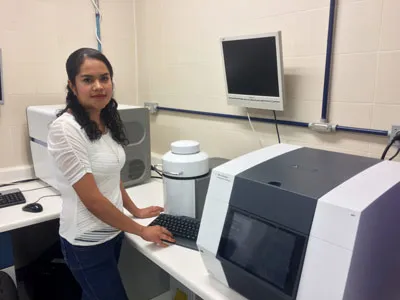In the search for new alternatives for the treatment of type 2 diabetes mellitus, a team of scientists from the Biomedical Research Unit of Zacatecas (UIBMZ) of the Mexican Social Security Institute (IMSS), determined that a variant of the receiving gene - denominated P2X7- Create a protective effect against that disease.
The research project is led by Dr. Mariana Haydee García Hernández and Dr. José Antiso Enciso Moreno, both members of the National System of Researchers (SNI) of the National Council of Science and Technology (CONACYT), in coordination with doctors Diana Patricia Portales, Roberto González Amaro, Edith Elena Uesti Rivera, Laura Elizabeth Gaytán Medina and Nancy Cortez Espinosa, of the Autonomous University of San Luis Potosí (UASLP).
In an interview with the Conacyt Information Agency, Dr. Mariana Haydee García Hernández said that this project is funded by the Conacyt Health and Social Security Sectorial Fund.
“The objective of this project was to analyze some genetic variants that are associated with the increase in the function of pancreas cells, beta.We find that the increase in the function of the P2X7 receptor, due to the presence of a genetic variant, guide to the secretion of more insulin, which is the hormone responsible for regulating the amount of glucose in the blood, ”he said.
For his part, Rocío Edith García Jacobo, a student at the PhD in Basic Biomedical Sciences by the UASLP, added that the increase in the function of the P2X7 receiver, in addition to secreting insulin, also produces the cytokine called IL-1stControl of blood glucose levels.
“We did the evaluation from 200 samples, of which 100 corresponded to patients with type 2 diabetes and 100 subjects who did not have a history of diabetes or any other inflammatory disease such as arthritis or tuberculosis.What we found was that people who have a polymorphism in the P2X7 receiver gene have a protective effect on the development of type 2 diabetes, ”he explained.
The Conacyt fellow said that the results obtained so far indicate that people who had no history of diabetes presented a protective effect due to the presence of the P2X7 receiver gene, which releases them from the disease.
“Now, what we want to verify is the function of the pancreas cells, of the beta type, this evaluating the presence of the C PeptideMore insulin, ”he said.
The Basic Biomedical Sciences also specified that another of the findings of this study is the discovery of an association between people who have polymorphism and the decrease in glucosylated hemoglobin - ameter that measures the average glucose and determines the presence of diabetes-, which means that polymorphism favors the balance of glucose in patients.
“For now, we seek to investigate the participation of genetics more to strengthen the data obtained so far and with that knowing what could help us to propose new alternatives, because if the use of the P2X7 receiver is flattering, it could be stimulated as therapy for therapy for therapy forThat people prone to diabetes due to genetic features can prevent or postpone the disease in a natural way, ”he concluded.


